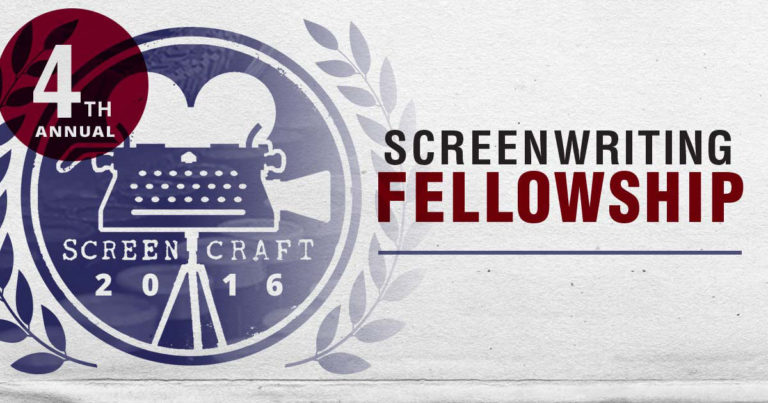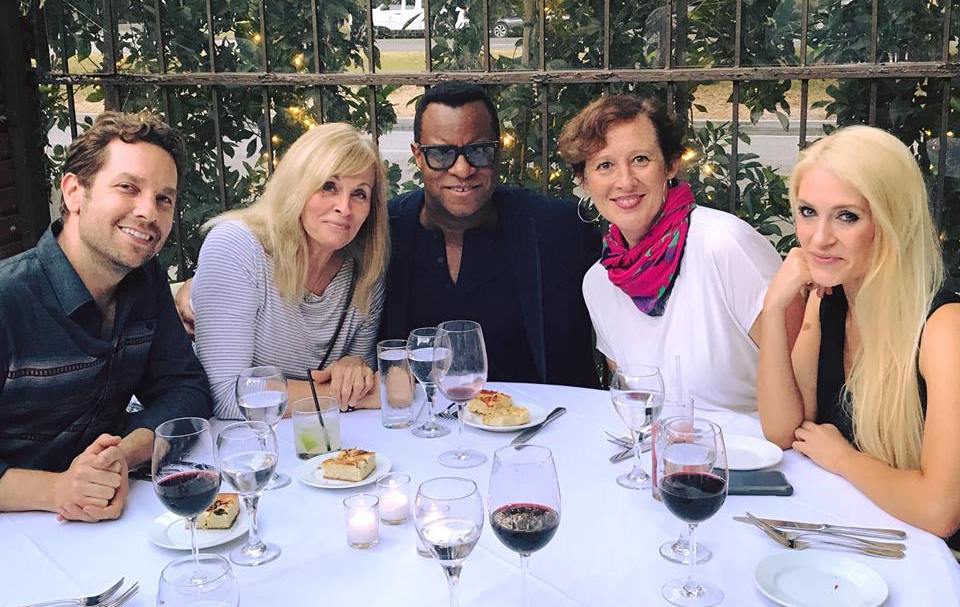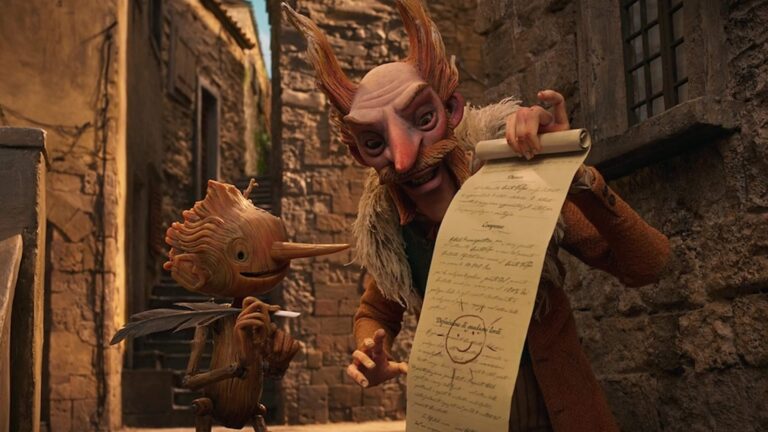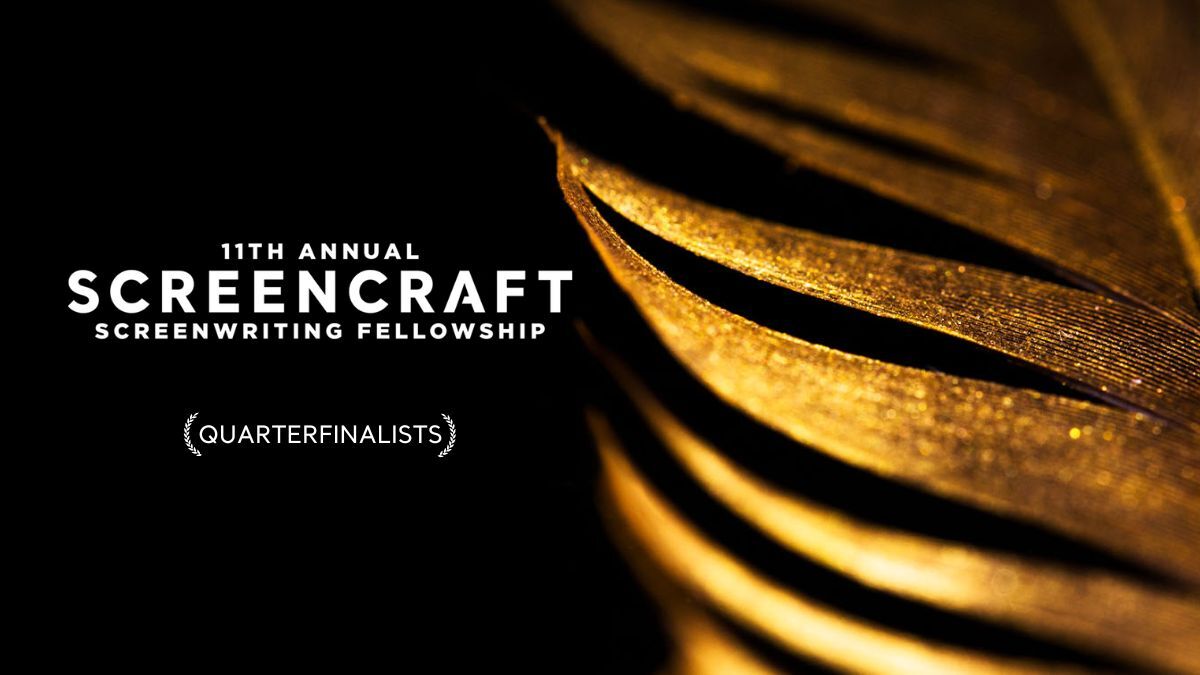One-On-One with the Recipients of the 4th Annual ScreenCraft Screenwriting Fellowship

Back in May, we announced that Anna Klassen (14 Words), Anya Meksin (Taminex) and Ryan W. Smith (Jacaranda) had been chosen as the recipients of ScreenCraft’s 4th annual Screenwriting Fellowship. Culled from over 2000 scripts submitted from across the globe, the winning screenplays and their writers represent three of the most talented emerging voices in film and television.
Over the summer, we had the pleasure of flying all three Fellows out to Los Angeles for a week of invaluable meetings with development executives and industry insiders. During their stay, we made sure to sit down with Ryan, Anya, and Anna to get their thoughts on the fellowship experience, the screenplays that brought them here and their next steps as professional writers.

From left to right: ScreenCraft winner Ryan Smith, Diana Ossana (Academy Award-winning screenwriter of BROKEBACK MOUNTAIN), Geoffrey Fletcher (Academy Award-winning screenwriter of PRECIOUS), Kristina Reed (Academy Award-winning producer of Disney's FEAST, as well as Disney's FROZEN and BIG HERO 6) and ScreenCraft winner Anna Klassen.
Tell us a little bit about your ScreenCraft Fellowship experience so far. What part of the experience has proven to be the most beneficial?
Ryan: The ScreenCraft Fellowship experience has been incredible! Each step of the way, John and Cameron have not only met, but far surpassed my expectations. They have opened a whole slew of doors for me, and introduced me to many wonderful, talented people. I would say that I’ve benefited most from the ScreenCraft team sharing their industry knowledge and vast network of relationships.
Anna: The ScreenCraft fellowship has been hugely beneficial in many ways, but perhaps most beneficial is the contacts I’ve made. Thanks to meetings set up through the fellowship, I’ve met executives, producers, and other screenwriters who were willing to hear my pitches and read my material. They’ve since kept in touch and are excited to read subsequent scripts. In this industry it’s often about who you know, and ScreenCraft has helped fill in my rolodex of contacts substantially!
Anya: Staying at the Hotel Normandie for 4 nights, getting flown out to LA, and getting the $1000 stipend were all really wonderful experiences, and gave me a much needed boost of confidence. It was also really nice having Cameron and John shepherd me through the industry meetings personally. They spent a lot of time making sure I was comfortable and supported throughout the process, and I will always remember their genuine kindness and effort on my behalf.

STX Development Executive Jeannette Francis meets for lunch with ScreenCraft Fellowship winners Anna Klassen and Ryan Smith. STX’s recent films include BAD MOMS and THE GIFT.
You’ve each just wrapped a week of meetings here in Los Angeles. Give us a rundown of some of your favorite moments.
Ryan: Walking onto the Warner Bros. lot for the first time will always be an iconic moment in my mind. So much movie history has occurred within those walls. What a privilege! I also really enjoyed all of the conversations I had with the various development and creative executives throughout the week. Each industry pro had a pearl of wisdom to impart, be that about how best to pitch myself and my material, how better to understanding the studio system, or about the ups and downs that come with a career as a writer.
I also gained some serious insight from meeting with well-established writers in the field. I feel so fortunate to have grabbed breakfast with Steven E. de Souza (Die Hard) and Michael Colliery (Face/Off). I also loved having an inspiring dinner with Oscar-winners Diana Ossana (Brokeback Mountain), Geoffrey Fletcher (Precious) and Kristina Reed (Feast).
Anya: One of the most interesting meetings I had was with screenwriter Max Borenstein (Godzilla, Kong: Skull Island), who shared some of his experiences of writing for both film and TV, as well as running his own Writers Room.
Anna: My favorite moment from the week of meetings was our mentor dinner with three Oscar-winning screenwriters. It was invaluable to hear their stories and pick their brains. These are people who have succeeded in this industry, and being able to ask them how they got their start way back when gave me a tremendous amount of inspiration and hope for my own screenwriting career.
What sort of unexpected or surprising advice did you receive?
Ryan: During our dinner with Diana Ossana, Geoffrey Fletcher and Kristina Reed, we spoke about the consequences of success, and what one must do in order to continue striving for excellence. I was deeply inspired by their thoughts. In essence, their advice boiled down to the need for persistence, and the requirement that one should focus less on the “gloss" of the “business” and more on the work, itself. It’s all about the work. If you can carve out headspace for pure, sincere, creative work, success in some form will follow. Work hard, continue to learn, be humble and inspired, and powerful pieces will emerge.
Anna: There is so much I've learned during the fellowship that was extremely eye-opening. Meeting with executives really showed how much work it takes on everyone's end to see a script from conception to distribution. In 2017, when the film and TV landscape is crowded with so much talent, it's takes a whole lot more than a perfectly crafted script to get material sold.
I learned the importance of packaging your script with a director and/or actors. I also learned that some companies are only looking for talent who have legs overseas — so even if you have a huge name attached to star in your script, if that person doesn't bring in serious bank overseas, its a moot point. It was a bit disheartening to hear just how hard it is to see something made, but I was grateful to learn where screenwriters fit into the process and how I can improve my scripts to speak to these new demands.
Anya: I spotted Werner Herzog at Soho House, where I met with independent producer Kim Bailey for a delicious lunch. Herzog was coming in as we were leaving, and seeing him brought back memories of the time he came to our film school to offer advice about filmmaking. The two pearls of wisdom I remember best are "Preparation is for cowards" and "You cannot make art if you have not experienced suffering." I tend to agree with the latter statement more than the former!
Let's talk a bit about your winning screenplays. Tamirex, 14 words and Jacaranda are all vastly different in terms of genre, although each is grounded in particularly resonant themes.
Anya: TAMINEX was a way to channel my paranoid anxiety about illness and mortality, which I’ve always felt to be intertwined with intimacy and love. I wrote the first draft in Katherine Dieckmann’s screenwriting class at Columbia, and then collaborated with my husband and writing partner William Gerrard on subsequent drafts—too many to count. I took the script through the IFP Project Forum in both Emerging Narratives and the No Borders Co-Production Market, and continued developing it with input from our manager at Circle of Confusion, Lawrence Mattis.
Perhaps because I was raised by two scientists, I gravitate toward science fiction and other genres that push the boundaries of what is possible. I’m fascinated (and disturbed) by technology’s relationship to our minds and bodies, and by the massive paradigm shifts that seem to be destabilizing so much of human civilization. In addition to TAMINEX, my husband and I have written a sci-fi feature called THE ALGORITHM, currently in development at Gidden Media, about an immediate future in which big data is used to predict people’s behavior and criminal activity. We’ve also developed a sci-fi TV series called SEA CHANGE that brings to life today’s scientific predictions about catastrophic climate change.
Anna: The inspiration to write 14 Words comes from a deeply personal place. My grandmother was raped and murdered in Indiana in 1969, and one of the suspects in her case is the KKK.
My grandparents were champions of the Civil Rights Movement, and when my grandfather invited the head of the Black Panthers to speak at the mental health clinic where he worked, he received death threats from hate groups. Though my grandmother's killers were never found, the KKK — who had ties to the police force — remains a primary suspect.
I've struggled with coming to terms with my grandmother's murder my entire life. I wrote 14 Words to both work through my own pain and also confront issues of hate and intolerance that are still distinctly prevalent today. I did four months of research on Neo-nazi cults and modern hate groups in order to get inside the minds of the men who may or may not have murdered my grandmother.
My protagonist, Sophia, is a culmination of my grandmother, my mother, and myself. Though we will never be able to face her murderer, Sophia can, and she does so by infiltrating the hate group that killed her own mother. There, she faces the cult's hate and toxic masculinity head on.
This story is a work of fiction, yes, but it is very much inspired by real events that have occured for centuries — and are still happening today.
Ryan: While Jacaranda is in many ways an action-thriller (with heart), as a story, it could not exist apart from the era in which is takes place. The screenplay is very much a product of South Africa’s dark and complex history. I was inspired to write it through reflecting on various memories and relationships from my childhood, growing up in Johannesburg, at the tail-end of Apartheid.
I wanted to explore my past and the history of those who were close to my family. The deeper I dug, the darker it got — and, yet, even as I researched these tragic pieces of South Africa’s story, I saw glimmers of hope in the humanity of those involved in both sides of the conflict.
Do you feel better equipped now to take your next steps as a professional screenwriter?
Ryan: I do feel more ready. Gaining insight into the practical elements that guide an executive’s decision-making process has been helpful. While I will always be driven primarily by Story, I do appreciate that this industry is the combination art and commerce. For me, my next steps are simply to create more content. I need to write, write and write some more.
Anya: As always, I try to fight my perfectionism and self-flagellation and just allow myself to explore ideas and follow my intuition without fear of failure. The emotional ups and downs of being in the industry can be really draining and stressful, and the lack of opportunities for women can be downright depressing, all of which inhibits creativity. I try to cultivate my sense of wonder, gratitude, and delight, so that writing can be a form of adventurous play and not a painful chore.
Anna: Absolutely! I feel much more equipped to pitch my script in a room, write my next script with an eye for what executives are looking for, and I generally feel more educated about the current state of film and TV. I cannot thank the Screencraft fellowship enough.
Looking ahead, what do you hope to gain most of all from the ScreenCraft Fellowship experience?
Anna: At this point I want to continue to build upon the relationships I began during meetings, continue the conversation with our generous mentors, and of course, stay in touch with John and Cameron, Screencraft's kickass founders who have been paramount to the success of this fellowship.
Anya: I would love to see TAMINEX, SEA CHANGE, or THE ALGORITHM get produced, but since those things are somewhat out of my control, I try to focus on developing new story ideas. Currently, I’m writing the pilot script for a historical fantasy TV series based on the Tarot, which has fascinated me since I was a child. I want to bring the magical world of Tarot cards to life through the powerful stories and characters hidden in the ancient images. I would also love to write for an existing TV show and gain the experience of working in a writers room.

ScreenCraft Screenwriting Fellowship winners Anna Klassen and Ryan Smith snap a photo in front of the iconic WB water tower after a general meeting with Cate Adams, development executive at Warner Bros Studios.
Get Our Screenwriting Newsletter!
Get weekly writing inspiration delivered to your inbox - including industry news, popular articles, and more!



























